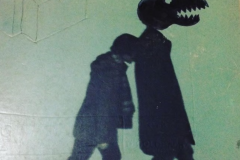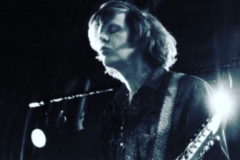Low is a band who has been changing the indie scene since the very beginning. As pioneers of the slowcore movement, the band caused ripples in rock just by taking the tempo down a little and playing quietly. Twenty-five years later, Low is still making waves. Their new album, Double Negative, is still just as morose and intelligent as their early work, yet somehow challenges the listener even more, incorporating elements of anxious and deconstructed electronic music—a “de-mix” of their signature sound, if you will.
With husband and wife team Alan Sparhawk and Mimi Parker’s instantly-recognizable harmonies and the band’s haunting melodies, Double Negative is at once an evolution from the sound for which they’ve been known for decades, and a completely natural progression for a band who has been growing since the start. We talked with Low founding member, guitarist and singer Alan Sparhawk.
Ghettoblaster: How would you describe your latest record? What were you listening to while you were making it?
Alan Sparhawk: I would describe it as a relatively large step into the unknown for a band who has always flirted with the outer edges, but never fully jumped in with both feet. It is very removed from the way we play live and it was created during a time of traumatic and unforeseeable change in the world. We were mostly listening to our own desire to create something new and challenge ourselves.
GB: Low’s sound has evolved and changed so much over the years. What was your songwriting process like for the new album, and how is that process different now from what it was in your early years?
AS: The songwriting process is the same as the day we started the band—you start alone with nothing, fumble through some chords and thoughts, and see what comes out. Sometimes it comes quick, sometimes it’s just a fragment until you hear it sketched out, sometimes it takes years to find that last line or bridge. The recording process was very long and drawn out for this record, which made the songwriting phase cross over into the studio more. In the past, we would write everything and sort out arrangements then go into the studio for one or two blocked sessions and do the whole record. For this record, it was important to work a little, then go home and listen and write based on what we had done, then we would go back in and work a little more. It seemed very difficult and frustrating sometimes to ponder the options, but as we started seeing things emerge and take this unexpected form, we knew we were on to something.
GB: If you wouldn’t mind, could you talk a little about mental illness? Is making music an effective coping mechanism for you?
AS: I’m glad that it seems like every year, people are getting more open about talking about mental illness. I think it helps to know you are not alone. It helps when people are more informed and understanding of those who suffer from it. Also, I worry as I see the world become more unstable and isolating, that more people are suffering from stress and being pushed to their limits. There has always been people with mental illness, but it sometimes seems that in this modern world of sensationalism, celebrity, and ideological leadership, more is at stake and people seem to be reaching for more and more extreme manifestations of their chaos. Also, the social dialogue and embrace of violence that modern life has brought recently seems to create a more violent scenario for the person who is losing their mind and looking for the most destructive act they can commit. Sadly, the more violence we see, the more we see. Music has been a great soother and a channel to direct all kinds of trauma and hope. I think it is the language we spoke before we came to earth and it will be the language we speak together in the eternities.
GB: Personally, Low is my go-to music every time I’m feeling depressed. Do you have a band or record like that? Have fans reached out to you to talk about how Low has helped them over the years?
AS: I distinctly remember as a teenager, listening to “Comfortably Numb” by Pink Floyd one time on headphones, thinking “this guy doesn’t know me, but he sounds like he knows how I feel,” and when he asked me to show him “where it hurts,” I discovered that I did hurt, that it had been there for my whole life, and that I could look at it as a separate thing instead of as an inseparable part of me.
Experiences like this made me want to be part of music, part of this reaching out to one another. I don’t like to admit it—artists are supposed to be only beholden to their own self, but I want to make music that lifts people. I want to help people see themselves clearly and in a hopeful light. I know the darkness and I know that most of the time it just takes a kind moment or voice of friendship to bring someone out of the nightmare, even if it’s just for a moment. I don’t think we present any answers or solutions, but if we just try to stay true to our own experiences and inspiration, it seems like it resonates with the people who hear it. There have been people who have thanked us for help through tough times and depression. It reminds me of those Pink Floyd songs. I’m grateful.
GB: Though you are not specifically a “Mormon band,” you have talked about how your religion informs your lyrics. Has your band ever been treated differently in the “rock scene” because of your faith? Conversely, how has being in a successful secular band been received from within the church?
AS: I don’t know if we have been treated differently. There are times when I’ve wondered… I’ve noticed a difference between the US and Europe in the way people interview us about that subject. In the US, rock n’ roll is still looked at as the opposite of church, so they don’t know what to do with us. They take us less seriously than the press outside the US. Europe interviewers are always comfortable asking about religion, while the press in the US is generally too busy being cool and proving to their dad that they are not him. I imagine there are people who maybe dismiss or disparage us because of the religion, but none of them have actually said anything about it to our face. The people at church think it’s pretty cool. It’s a strange profession, no matter who you’re talking to, religious or not. The image of rock n’ roll being this non-stop demonic hotel-trashing circus is on the decline, but still most people think its a lot more bizarre than it really is. Anyone who gets to know us sees that it’s just living life.
GB: What is it like being in a band with your spouse? Do you sing around the house in your trademark harmonies? What do your children think of your band?
AS: It has been a great blessing to have worked together in the band. When we were first married, we would talk and dream of finding a life where we could work together side-by-side. We had known each other since age 9 and have been a couple since high school. We were married at 21 and started the band at 25. Sometimes it can be hard. A hard or bad day for the band can be a hard or bad day for the relationship, but then creating together and experiencing the struggles and transcendence together is the essence of our union. We have been fortunate to be able to work with great people over the years that help us complete the picture and inspire us to go beyond ourselves. That has been vital. If we were left to ourselves to motivate each other, it would not have been. Being inspired together was key.
Home is both the source of and the refuge from what we do, so it’s a mixed vibe. We do sing around the house sometimes, but not as much as people would maybe imagine. Writing is a very lonely process. We don’t write together usually. Once a song seems presentable, I’ll play it for Mimi first. She usually finds harmony right away. Same with her. She will just show up one day with a song or two, and I will have not known when she wrote them. Songwriting is so personal and fragile—it really has to start with you, alone. I sometimes wonder if we would be more productive if we were constantly writing and singing all day at home, but I think creativity likes boundaries. It likes to have it’s special time and place. You need time and space away from it to then come in with purpose and intent.
Our kids grew up with the band, so in some ways they are too close to really see it. Our daughter is in university now, and has had enough time to find her own music and it has somehow led her to us on her own terms, so that nice, but the teenage son likes the teenage son stuff for now, so lots of Slipknot, Rage Against the Machine, John Denver, and rap. I did play him some Magrudergrind the other day and he texted back later asking for the name of the band.
GB: Is there anything else you’d like Ghettoblaster readers to know about Double Negative or Low?
AS: We could not have made this record without BJ Burton, the producer/mixer. He is a ferociously driven sonic explorer and his sense of confidence in the face of the unknown was vital in getting us through the process and helping us see that we could do much more and take much bigger chances with what we can do. A quick listen through other things he’s recorded, and it’s obvious that he’s one of the few people in the studio these days still trying to find the outer limits.
Facebook | Instagram | Twitter | Website
Photo: Paul Husband
Words: Josher Lumpkin








Social Media